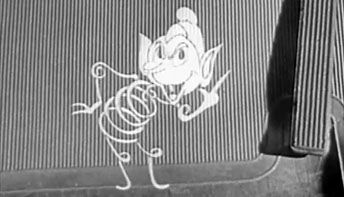One of the disappointments of the new series of Mystery Science Theater 3000 has been the lack of shorts. Not the serials of the early series but the truly bonkers educational shorts that were shown to—well, my mom, presumably. A lot of them are from the fifties, after all. I won’t deny that we saw some when I was growing up, not least when I was a student aide in a drivers’ ed class, but I missed what appears to be the golden age of educational shorts, and I can’t help wondering how a generation could grow up watching things like “A Case of Spring Fever” in school and then complain about anyone else’s education.
Admittedly, that’s one it’s hard to picture being shown to school kids, given the lead actor appears to be approximately 107 years old. (Coily is voiced by Pinto Colvig, whose long career most famously includes the voice of Goofy.) Still, there are an astonishing number of similar shorts, wherein people learn the importance of paper bags or whatever, enough so it was parodied on a Simpsons episode where a kid learned about how awful a world without zinc would be. And that one was shown in a class, so you figure, you know, the writers at least remembered seeing those in school.
Similarly, Troy McClure’s taking a kid on a tour of the slaughterhouse suggests that, yes, that weird Hormel short was shown in schools. I think I personally might’ve seen at least one ACI “At Your Fingertips” or similar short as a kid, though getting a projector into our classroom was such a production that I don’t think we watched a lot of films of any kind. (Yes, I’m old enough so we used projectors when I was in elementary school and even somewhat into high school.) A common RiffTrax joke on these is that the teachers are taking naps and similar during the short, and that feels right, especially speaking as someone who used to be the kid running the projector.
Because of course, the important thing to note about a lot of these is that they are not actually all that educational. I’m a big fan of both incorporated videos into education and giving kids breaks, but it seems clear that these were, in many cases, midway between. Was “Posture Pals” really more educational than actually just talking to kids about the value of posture? Almost certainly not. There’s an ACI short at a county fair that feels like it might involve teaching some words, but not in any actually useful way.
The actual history of the companies behind these shorts is fascinating, and there’s a whole book about it that’s very much worth reading. And of course, famously, Carnival of Souls was made by some people from Centron on their summer vacation. But we’re not here to talk about the corporate angle. Nor the fact that my kids genuinely find some of them more entertaining than they will in even a few years—yes, the ACI shorts are insane, but my kids routinely tell me they want fancy headdresses and grass masks and whatever nonsense they’re making in those shorts.
No, it’s the very concept of watching them and calling them “educational.” Now, it’s true that the Cheating Short owes its roots to the idea that “Paper and I” was corporate propaganda and not truly educational and there was room for things beyond “this industry has value” that could be taught by film. But is the best way to learn about the importance of home economics to watch Kay getting a degree in it? Is the best way to learn why to study industrial arts to watch a bunch of half-clad teenagers talking about making furniture?
In the case of my own childhood, was that film strip about nutrition that actually talked about cod liver oil like it was a thing anyone consumed anymore the way to teach us about vitamins? And would a film have been better? I suppose it was probably long-term cheaper than buying books to teach us the same thing, since you only needed one film strip, and you only needed one copy of “Body Care and Grooming.” I also happen to know that all those road pizza movies for Drivers’ Ed were sent not just from classroom to classroom but school to school in my district.
Yes, it’s important to remember that no few of the MST3K shorts—like “Hired!” and “The Selling Wizard,” to name a couple—were actually made to be shown in a more corporate setting. Which they clearly knew, given their conclusion to “Out of This World” and who you should remember their selling points. Mostly, though, these were intended to teach children who would grow up to complain about the dumbing-down of education.
I won’t make you imagine a world without my columns, but it would be nice if you’d contribute to my Patreon or Ko-fi!

